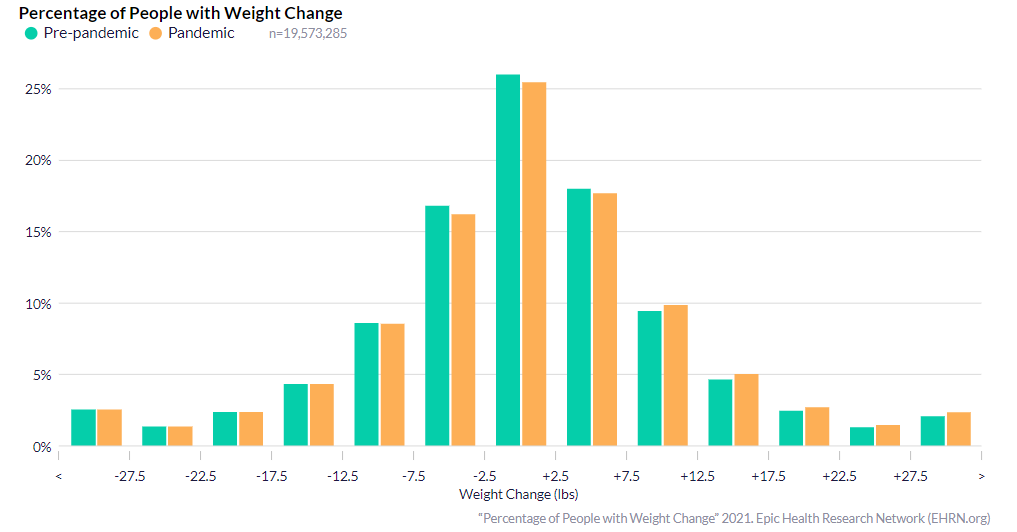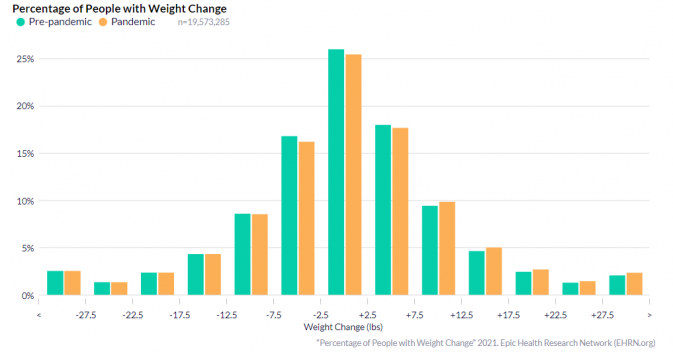
[ad_1]
I’ve been seeing a lot of reports in the media about how much weight everyone supposedly gained during the pandemic year. And some of the numbers are pretty alarming. One highly regarded source reported an average weight gain of 25 pounds. Another widely reported survey put that number even higher at 29 pounds.
Meanwhile, everyone on social media is bemoaning the fact that returning to in-person work is going to require a whole new wardrobe because they can no longer fasten their so-called “hard pants.”
Internet memes and jokes aside, massive weight gain in a large proportion of the population would have serious implications in the form of increased disease burden, risks, and disability. Fortunately, when you take a closer look at the data, the actual situation is not as dire or dramatic as news reports would suggest.
Questionable data, badly reported
One of these reports, for example, is based on an internet survey conducted by Harris Poll on behalf of the American Psychological Association. And, contrary to what you may have seen in the media, this survey did NOT find that the average person gained 29 pounds during the pandemic.
Four in 10 of those surveyed actually said that the pandemic did not result in any unwanted weight change. Twenty percent said that they experienced unwanted weight loss as a result of the stress. The remaining 40% said that the pandemic had led to unwanted weight gain — and the average reported weight gain among that group was, indeed, 29 pounds. But only half of those (or 20% of all respondents) reported gaining more than 15 pounds.
Keep in mind that all of these were self-reported changes not verified by any actual weight data. So it’s unclear how accurate people’s reports or recollections were. But clearly, it’s a gross misrepresentation to say that the average person gained 29 pounds during the pandemic. Most of the people in this particular survey didn’t report unwanted gain weight — and most of those who did gained less than half that much.
And what about the widely-shared article on the Harvard Health Blog that mentions a 25 pound weight gain? Again, all is not as it seems. The Harvard writers were reporting on data published by researchers from University of California, San Francisco.
This was a much smaller sample size, involving just 270 people, who were tracking their weight using a Bluetooth-enabled scale as part of a cardiology study. So the data are certainly more reliable. They found that subjects gained an average of six pounds over four months, starting in February 2020, just as the country was going into lockdown.
So where did that 25-pound number come from? That was the result of pure speculation on the part of the Harvard writers. Had that pace of weight loss continued for another 12 consecutive months, they reasoned, it would have added up to 25 pounds. But there is absolutely no data to suggest that this is what actually happened.
So, what actually happened?
The truth about pandemic weight gain
Epic Health was able to to analyze weight data on almost 20 million people who are covered by their health system and found a very different story. The average weight gain over the pandemic year was about one pound. But as we saw with the survey data, averages aren’t always the best way to see what’s going on across a population.
Another way to look at the data is to look at the distribution of weight changes: What percentage of the population lost or gained less than five pounds, five to 10 pounds, 10 to 15 pounds, and so on. (This is called a histogram.)

When you look at a histogram of the Epic Health weight data, you can see that small changes in weight are far more common than big changes. More importantly, when the researchers compared weight changes during the pandemic year to weight changes over the previous pre-pandemic year, the pattern was almost identical. The pandemic had almost no impact on the number of people who gained or lost weight or on how much they lost or gained.
But why does this matter?
Clearly, bad news gets more attention. And it appears that the news on pandemic weight wasn’t nearly as bad as the headlines suggested. But I’m afraid that stories like these can undermine people’s resolve to take action to address their own weight gain by suggesting that weight gain was unavoidable and universal.
The dangers of normalization
We shouldn’t take our cues for what is possible from others but, as social creatures, we do. We match both our behaviors and our expectations to the cues around us.
As the number of overweight citizens has grown, we have adjusted our notion of what normal weight is. A person who, 50 years ago, would have been described as overweight (both by doctors and by casual observers) is now perceived (both by doctors and casual observers) as normal weight — in the same way that we have come to view oversized portions as a normal serving size.
When there’s more on the plate, we assume that we should eat more. When everyone is overweight, it may seem safer or more acceptable to remain overweight ourselves. But while it may be more acceptable, it is of course, not safer.
Can You Be Healthy at Any Size?
And that’s why this false narrative that “everyone” gained 25 pounds during the pandemic is worth correcting. Everyone did not gain weight. In fact, a minority of people gained weight. And of those who did, most gained less than five pounds.
This is in no way meant to denigrate or discourage those who may have gained a significant amount of weight over the last year. To the contrary, it is meant to encourage them not to dismiss unwanted weight gain as no big deal or accept it as an inevitable result of the pandemic year.
Weight gain can seriously impact both your physical and emotional health and well-being. And there are health professionals who can support you in pursuing healthy weight loss, through behavior modification, lifestyle change, and — if needed –medical, psychological, or pharmaceutical support. And if you do have quite a bit of weight to lose, remember that even a modest weight loss can have a significant positive impact on your health. So don’t let how far you need to go keep you from taking those all important first steps.
[ad_2]
